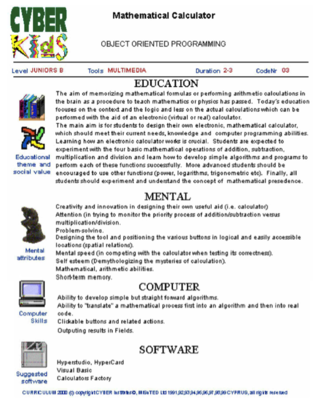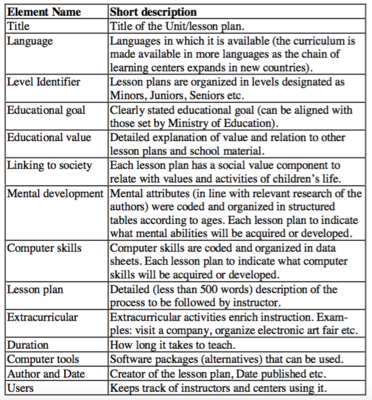The KnowledgePacket® Innovation
Jump to navigation
Jump to search
CYBER KIDS introduced in 1991 an innovative concept, which decades later is now emerging as a new standard. The innovation was called KnowledgePacket®, a term coined by Yiannis Laouris to denote that each 'unit' in a curriculum (and/or unit of knowledge) to be transferred should include multiple dimensions. Each lesson plan is structured as a 'packet' that combines goals in dimensions ranging from the actual educational content, delivery methods and tools, psycho-developmental goals, as well how to apply it in real-life.
A KnowledgePacket® is composed of:
- The actual know-how and data to transmit to receiver/learner
- The Method of Delivery/Transmission and/or Lesson Plan
- The Tools to use in the process
- The Mental Development that will take place during the learning process
- Real-life applications of the specific knowledge
- Social value and importance of the specific knowledge"
- Author of the KnowledgePacket 8. Owner of the KnowledgePacket
Publications in which the KnowldgePacket® concept was mentioned or described
- Laouris, Yiannis (2014). Teams Construct Knowledge During Project-Driven Social Interactions: A Facet of the CYBER Kids Method. Benjamin Press, Tokyo, New York.
- Laouris, Y. & Eteokleous (2005). We need an educationally relevant definition of mobile learning. (Originally presented in. Proc. 4th World Conference on Mobile Learning, mLearn 2005, Oct 25 – 28, Cape Town, South Africa) On line: www.mlearn.org.za/CD/papers/Laouris%20&%20Eteokleous.pdf
- Laouris, Y. (2011). Change society bottom up: The Cyberkids experiment, Part IV, Chapter 10 & The Future is mobile, Part VI, Chapter 11. In J. Healy (Ed.), Failure to Connect, Greek edition. Create Space, USA.
- Laouris, Y. & Anastasiou, H. (2005). The introduction of IT in the lives of children as a service to global peace: Experiences from a nation-wide experiment 15 years after. Proc. 4th World Conference on Mobile Learning, mLearn 2005, Oct 25 – 28, Cape Town, South Africa. On line: www.mlearn.org.za/CD/papers/Laouris%20&%20Anastasiou.pdf.
- Eteokleous, N., & Laouris, Y. (2005). Are we moving too fast towards integrating mobile devices into educational practices? Proc. Seeing, Understanding, Learning in the Mobile Age, Budapest, April 28–30, 2005, 197-205. Abstract at: http://www.fil.hu/mobil/2005/Laouris-Eteokleous.pdf. Full paper: http://www.cnti.org.cy/cnti_research/Publications/ConferenceFullPapers/Cyprus_Budapest150305.pdf
- Laouris, Y., & Eteokleous, N. (2005). Experiences from the application of knowledge packets as means for educationally, mentally, and socially balanced instruction. Recent Research Developments in Learning Technologies. 485-489. On line: http://www.formatex.org/micte2005/195.pdf
- Laouris, Y. (2005). Educationally relevant meta-data in learning objects: Necessary condition for re-usability. In: O. I. Hillestad & A. Bopardikar (Eds.), Proceedings Cost276, May 26-28, 2005, pp 61-66, Trondheim, Norway.
- Vakanas, G., Laouris, Y., Symeonidou, M., Loizou, E., Stylianou, S., Kouppe, P., and Georgiades, D. (1994). Mythology as a rich and meaningful context for integrated learning of literacy, numeracy and scientific inference: New possibilities. In J. Wright & D. Benzie (Eds.), Exploring a New Partnership: Children, Teachers and Technology, Proceedings of the IFIP TC3/WG3. 5 International Working Conference on Exploring a New Partnership: Children, Teachers and Technology, Philadelphia, PA, USA, 26 June - 1 July, 1994. IFIP Transactions A-58 Elsevier 1994, pp. 173-179.
- Laouris, Y. (1995). Towards a new Logo based on principles of object oriented and parallel processing. Educational Conference at Intercollege. Cyprus.
- Laouris, Y., & Symeonides, M. (1996). The computer in service of science subjects in elementary schools. First Cyprus Pedagogical Institute Conference 27/1//96, Cyprus.
- Laouris, Y., & El-Haddad, C. (1997). The use of electronic story boards in the assessment of retention and learning attributes. 2nd Congress of the Cyprus Society of Psychiatrists, Cyprus.
- Laouris, Y., & Makris, P (1997). A new computerized approach in the study of dyslexia using simple geometrical drawings on the computer. 2nd Congress of the Cyprus Society of Psychiatrists, Cyprus.
- Laouris, Y., Alexandrou E., & Kalli-Laouri, J. (1997). Case study: Improvement of technical and social skills for an autistic child using a computer rich environment. 2nd Congress of the Cyprus Society of Psychiatrists, Cyprus.
- Laouris, Y., (1997). Introducing children in OOP concepts using an interactive video game simulation. IEE CONF ABSTRACTS 1997 (Cyprus) Proc., p. 00.
- Laouris, Y., Minaidou, D., & El-Haddad, C. (1997). Computer interface for studying letter, word and pattern recognition strategies when interacting with computer screens. IEE CONF ABSTRACTS 1997 (Cyprus) Proc., p. 00.
- Laouris, Y, & Symeonides, M. (1997). Thumbnail representations in modern operating systems and other computer environments: Their effect on human machine interactions. IEE CONF ABSTRACTS 1997 (Cyprus) Proc., p. 00.
- Laouris, Y. (1998). Innovative education for the new millennium. A leap into the new millennium, HILTON, NICOSIA Dec 1998, Organized by IMSC Nikias Max.
- Anastasiou, H., & Laouris, Y. (1999). CYBER KIDS, An innovative approach in the introduction of informatics in the educational process, Mediterranean Computer Using Educators' Conference, University of Cyprus, Jun 1999, Proceed., p. 00.
- Laouris, Y. (2005). Educationally relevant meta-data in learning objects: Necessary condition for re-usability. Proc. 8th Cost 276 Workshop: Information and Knowledge Management for Integrated Media Communication, May26-28, 2005 pg. 61-65.
- Laouris, Y., & Anastasiou, H. (2005). Experiences from a nation wide experiment introducing IT in lives of children; Fifteen years after. Proc. 4th World Conference on Mobile Learning, mLearn 2005, Oct 25 – 28, Cape Town, South Africa.
- Laouris Y., & Eteokleous. (2005). We need an educationally relevant definition of mobile learning. Proc. 4th World Conference on Mobile Learning, mLearn 2005, Oct 25 – 28, Cape Town, South Africa.
- Laouris, Y., Papadopoullou, Y. & Gerjets, P. (2005). Ubiquitous adaptation of learning objects to the level of the learner. Proceedings Cost219ter Workshop Accessibility for all. Ayia Napa Cyprus, Oct 7.
- Laouris, Y., & Eteokleous, N. (2007). A simple model of SMS-based learning objects in the context of e-learning environments. Proc. EARLI Conference, Budapest, Hungary, 26-31 Aug. 2007.

